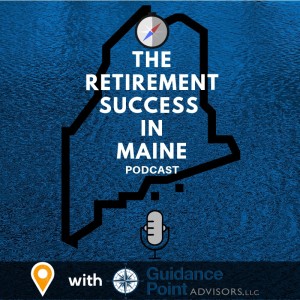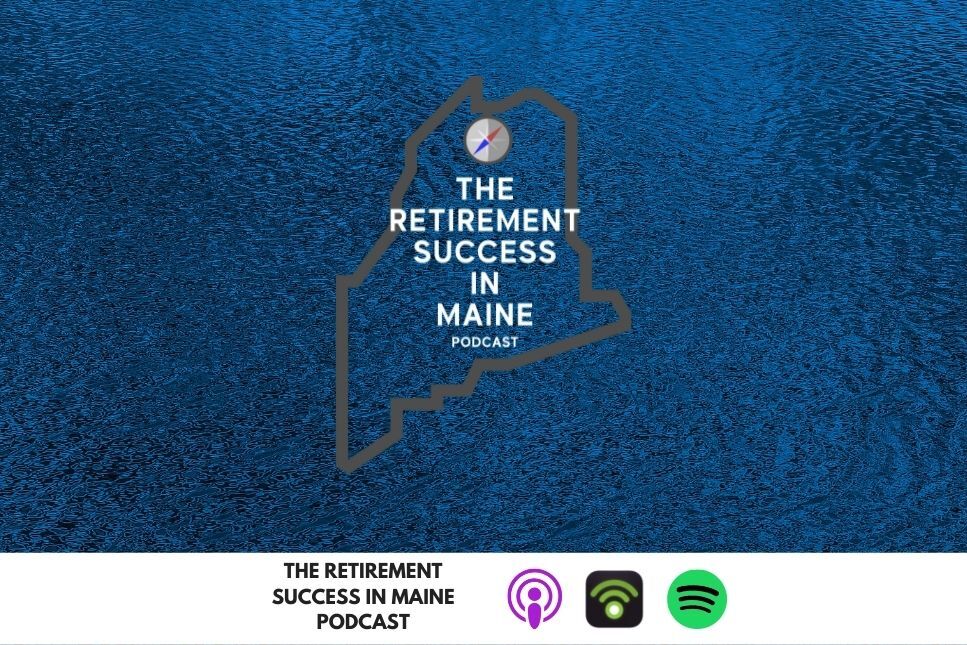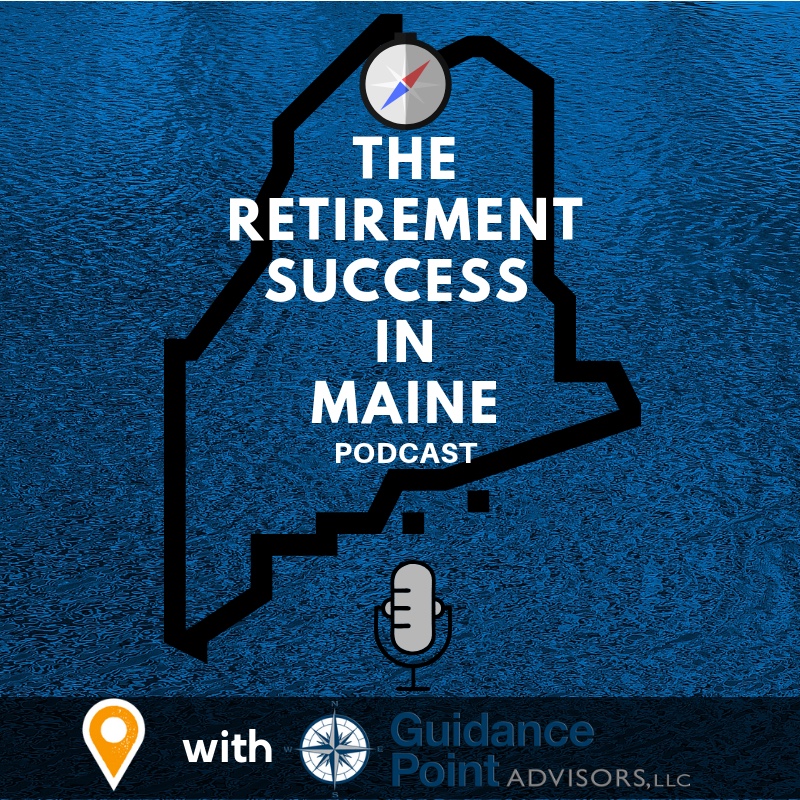Episodes
Episodes



Wednesday Sep 30, 2020
Mastering Communication to Get What We Want in Retirement with AmyK Hutchens
Wednesday Sep 30, 2020
Wednesday Sep 30, 2020
EP 027: Communication is hard. We were all born with a voice box, but it didn’t come with instructions on how best to use it. We see this in our financial planning sessions with clients ~ there are just some things they don't know HOW to say. We could be EMBARRASSED by feeling something or maybe we don't know how to navigate tough conversations without saying something we'll regret, giving our power away, or damaging relationships. Enter AmyK Hutchens - Master Communicator! She has consulted with The Home Depot, Starbucks Canada, Comerica Bank, Expedia, Lockheed Martin, Securian Financial, Walmart, John Paul Mitchell Systems, and hundreds more. She travels the globe sharing with executives, influencers, and go-getters on how to navigate their toughest conversations. With that, we wanted to have a REAL conversation with AmyK around Mastering Communication to Get What We Want in Retirement in Episode #27. Check it out and see why life happens one conversation at a time!
Chapters:
Welcome, AmyK! [2:03]
What’s the biggest tip that AmyK can offer to us to approach life conversations? [22:13]
What has the thought that “Life happens one conversation at a time” meant to AmyK throughout her life? [30:15]
What advice can AmyK give people to overcome fears and anxieties about stressful conversations? [33:26]
How would AmyK counsel someone to share their goals and aspirations throughout their life/relationships? [37:42]
How can someone start a conversation to help repair a relationship that over time, has degraded? [45:18]
What are some key takeaways from AmyK’s book, Get It: Five Steps to the Sex, Salary and Success You Want? [51:04]
How is Retirement Success defined for AmyK? [54:36]
Ben, Abby, and Curtis wrap-up the episode. [56:31]



Tuesday Sep 15, 2020
The One-Year Anniversary Special
Tuesday Sep 15, 2020
Tuesday Sep 15, 2020
EP 026: On this special episode of The Retirement Success in Maine Podcast, the show turns 1-year old! The team got together to recap the last year of the show, spending time discussing some key takeaways from the first 25 episodes. Ben, Abby, and Curtis also spend some time sharing what has surprised them the most from doing the show over the past year. The conversation wraps up with a discussion about where the show will go next. What will year #2 have in store? Be sure to tune in and hear what the team has to say!
Chapters:
What are some takeaways from the first 25 episodes? [2:00]
What has been surprising from the show thus far? [7:09]
What is some feedback we have received? [12:17]
What’s next for the show? [18:17]



Tuesday Sep 01, 2020
Rediscovering Self Purpose After Losing A Loved One with Bodhi Simpson
Tuesday Sep 01, 2020
Tuesday Sep 01, 2020
EP 025: On this episode of The Retirement Success in Maine Podcast, the team takes some time to discuss a necessary topic. Inevitably going through life we all experience the loss of a loved one, but how we process and grieve that loss may differ dramatically. At Guidance Point, Ben, Abby, and Curtis are often front-line to seeing this type of grief but are not professionally trained in the topic. So why not talk with someone who is? Joining this conversation is Bodhi Simpson, a Licensed Clinical Professional Counselor, and a Registered Art Therapist. She has a private practice in Waterville, Maine called Conscious Art Therapy. Bodhi shares her expertise and experience by answering numerous questions from the team, including, “What to expect when going through the grieving process and how can they get to the other side of finding themselves again?” “What does a ‘typical’ session with a grief counselor look like?” “How does someone find a grief counselor?” "What about suicide ideation ~ we hear it from clients from time and time and how should family members, friends, or professional relationships handle statements about suicide?"
Chapters:
Welcome, Bodhi! [3:07]
What makes the work that Bodhi does unique? [7:17]
What to expect in the grieving process?[14:00]
What is the session look like when someone seeks Bodhi’s help? [23:53]
What is a successful journey through the grief process? [35:31]
What is Retirement Success for Bodhi? [41:01]
National Suicide Prevention Lifeline Information. [43:08]
Ben, Abby, and Curtis wrap up the episode. [44:45]



Friday Aug 14, 2020
Why You Should Consider Retiring to the Bangor, ME Area with Cary Weston
Friday Aug 14, 2020
Friday Aug 14, 2020
EP 024: On our show, we've talked about "how" to retire, we've talked about some of the "why" reasons people retire, "who" they want to spend their time with, but we haven't talked about "where"....until now. For today's episode, we invited Cary Weston of the Marketing & PR Agency, Sutherland Weston, to talk to us about why retirees should consider retiring to the Bangor area. What are the crucial elements retirees are looking for in a place when they retire? What are some elements of Bangor that would help lead some of us to retire better there? Cary's past experience on the Bangor City Council and Mayor help us navigate these questions and more, so make sure to check out this latest episode! (Cary even spins a Stephen King story and points out some things that Bangor natives might not even know!)
Chapters:
Welcome, Cary! [1:55]
What are some fun things to do if you’re residing in Bangor? [19:18]
How easy is it to access fun things not located in Bangor? [22:05]
Discussion about the Healthcare infrastructure in the Bangor area. [23:19]
What makes people choose Bangor? [29:40]What kind of community can people look for when they're retiring in Bangor? [34:02]
How does the cost of living and property taxes in Bangor compare to other areas of the state? [37:49]
What housing opportunities are there in Bangor for retirees specifically? [45:33]
Just how bad are the Maine (Bangor) winters? [49:37]
What is Retirement Success for Cary? [53:01]
Ben, Abby, and Curtis wrap-up the episode. [55:42]
For more information and Bangor related resources, go to our blog at https://blog.guidancepointllc.com/24
or give us an email shout at bensmith@guidancepointrs.com, abigaildoody@guidancepointrs.com, or curtisworcester@guidancepointrs.com .



Friday Jul 31, 2020
Strategizing Retirement as a Solo Ager with Dr. Sara Zeff Geber
Friday Jul 31, 2020
Friday Jul 31, 2020
EP 023: In this episode, we're digging into the concept of "Solo Aging". Solo Agers are those without kids, where the "kids" are usually the ones who take care of us as we age. Did you know that according to a 2005 Pew Research Study, 19.4% of the boomer generation did not have kids? So this is a big concept looking forward. So what better guest is there than the author of Essential Retirement Planning for Solo Agers, an Amazon best-seller and in the words of The Wall Street Journal, one of the “2018 Best Books on Aging Well”. Additionally, Dr. Geber is a regular contributor to Forbes.com on the topics of aging and retirement.
Dr. Geber shares her expertise by not only spending time laying the groundwork and providing background knowledge about solo agers but also by answering questions like, “What is the key to happiness for solo agers?” “What mistakes are commonly made by solo agers?” “How can solo agers leave behind a legacy?” and more! Are you a Solo Ager or know someone who is? Then this episode is for you!
Chapters
Welcome, Dr. Geber! [2:33]
What does it mean to be a solo ager and how prevalent is being a solo ager nationally? [12:27]
What are some myths out there about solo agers? [16.57]
What has Dr. Geber found to be the key to happiness solo agers? [18:16]
What are some big mistakes that solo agers may make? [24:25]
How can solo agers leave a legacy? [27:58]
What can solo agers do to bolster their social networks, especially as they retire from their careers? [31:57]
What role does spirituality play with solo agers? How can people make spirituality more a part of their life as they age? [39:02]
What are some of the considerations for solo agers as they decide how and where to live in later life? [42:33]
What is Retirement Success for Dr. Geber? [52:27]
Ben and Abby wrap-up the conversation. [54:37]
For more information and Solo Aging resources, go to our blog at https://blog.guidancepointllc.com/23
or give us an email shout at bensmith@guidancepointrs.com, abigaildoody@guidancepointrs.com, or curtisworcester@guidancepointrs.com .



Wednesday Jul 15, 2020
Getting Healthier in Retirement with a Personal Trainer with Mike Wilcox
Wednesday Jul 15, 2020
Wednesday Jul 15, 2020
EP 022: One of the visualization questions we ask clients is, "What is important to you in retirement?" The answers vary but many times it's about pursuing our passions and what fulfillment means. We've spent a bunch of shows about the goal of achieving these passions. But what if I'm not very healthy as I approach retirement or I'm in retirement? If I think forward, I'm now at the FUN part of life where I can do what I want but I'm scared about how UNHEALTHY I am and that I won't be around to enjoy the most amount of retirement that I possibly could. Perhaps I'm not in very good physical shape, or I have eating habits that could be improved. What steps can I take to get HEALTHIER? With that premise, we reached out to Wilcox Wellness & Fitness with locations in Bangor & Brunswick, who received the 2020 Bion and Dorain Foster Award for Entrepreneurship from the Bangor Region Chamber of Commerce, to discuss this topic. Please join us in welcoming Mike Wilcox of Wilcox Wellness & Fitness!
Chapters
Welcome, Mike! [2:25]
What led Mike to start his own business? [8:25]
How has Wilcox Wellness & Fitness adapted to COVID-19? [15:48]
How do people (who are new to fitness) overcome their insecurities to not only walk through the door but to keep walking through the door? [25:06]
What motivates people throughout the different stages of Retirement to continue their health journey? [30:23]
How does Wilcox Wellness & Fitness help clients measure their success as they work towards their individual goals? [33:42]
What are some myths about retirees and pre-retirees when it comes to their fitness? [35:59]
How does Wilcox Wellness & Fitness address the thought that “It’s too late for me to start now”? [41:39]
How has Wilcox Wellness & Fitness helped retirees rediscover their life purpose or find that new passion? [45:59]
How can someone be re-motivated if they decide to stop pursuing their fitness goals? [49:00]
How can someone approach and address a concern about their partner’s health, without being hurtful or seeming judgmental? [52:49]
What is Retirement Success for Mike? [57:46]
Ben, Abby, and Curtis wrap-up the episode. [1:00:17]



Wednesday Jul 01, 2020
Divorcing in Retirement with JoAnne Meyers, Esquire, CFL
Wednesday Jul 01, 2020
Wednesday Jul 01, 2020
EP 021: In this episode of The Retirement Success in Maine Podcast, Abby, Ben, and Curtis are joined by JoAnne Meyers, Esquire, CFL. JoAnne discusses the uncomfortable topic of divorce, specifically “Gray Divorce.” JoAnne discusses the overall trends of Gray Divorce, including her thoughts on why there has been such an uptick recently. We asked JoAnne some hard questions, such as: what are some ways to approach a divorce if it feels like your relationship is heading towards this area? With those over 50 having higher than other life stages financial assets, a messy divorce can be catastrophic. How can each side of this minimize this damage? What are the different steps of getting a divorce? Is it different for this demographic? What about costs – what can someone expect to pay for divorce services? JoAnne also provides insight and even some suggestions on how a divorce can lead to a good outcome for everyone involved.
JoAnne founded her own practice, Novick & Meyers in 1996 and has used her unique background as a Finance Major and Certified Financial Litigator (CFL) designation holder to thoroughly investigate and evaluate financial issues in a divorce.
Be sure to listen in and hear everything JoAnne has to say!
Chapters:
Welcome, JoAnne! [3:18]
Introduction to Novick & Meyers and the services they offer. [9:54]
What is "Gray Divorce"? [16:09]
How does someone approach a divorce? [25:18]
What are some stories of good and bad outcomes to a divorce? [30:42]
What are the costs associated with the divorce process? [46:21]
What is Retirement Success for JoAnne? [51:17]
Ben, Abby, and Curtis wrap up the episode. [52:50]



Monday Jun 15, 2020
Monday Jun 15, 2020
EP 020: On this episode of The Retirement Success in Maine Podcast, the team is joined by John Diehl, CFP® of Hartford Funds. We wanted to have John on the show with us, not only to share his expertise as Senior Vice President of Strategic Markets for Hartford Funds but also because John also oversees Hartford Funds’ relationship with the Massachusetts Institute of Technology (MIT) AgeLab. With his experience at Hartford Funds and with the MIT AgeLab, John is considered an “all things retirement expert” and has been quoted widely in publications including The Wall Street Journal and made appearances on CNBC and Bloomberg Television. Our conversation with John focused on the retirement research conducted by the MIT AgeLab and how technology is having an impact on aging. John provided insight into questions like, how can someone visualize retirement? How is technology impacting the employment aspects of retirement? What impact does technology have on familial relationships in retirement? How is mobility affected by technology? and much more. Be sure to tune in to hear what John has to say!
Chapters:
Welcome, John! [2:49]
What is the MIT Age Lab and how has it developed? [11:26]
“Who will change my light bulbs?” [16:38]
“How will I get an ice cream cone?”[25:21]
“Who are you going to have lunch with?” [29:40]
How is technology impacting the employment aspects of retirees, especially in rural areas such as Maine?[35:24]
How is technology going to impact how family relationships stay intact throughout retirement? [43:09]
How is technology going to impact our mobility as we age? [48:06]
How can technology help people achieve the goal of staying in their homes as long as possible? [55:31]
What is Retirement Success for John? [1:00:04]
Ben, Abby, & Curtis wrap-up the episode. [1:07:21]

Finding Your Retirement Dreams and Working Through Your Retirement Fears
Our Maine Team of Guidance Point Advisors has been co-hosting a bimonthly podcast titled, "The Retirement Success in Maine Podcast," where we interview experts in their respective fields and retirees about how Mainers are discovering renewed purpose in retirement. " Its summary is "It seems like all of us are looking to race to the finish line of our careers and hopefully have enough resources to live on. But should that be the goal? By going in-depth to all areas of retirement, we hope to inspire you to visualize what your retirement will look like as you ask the question of whether you’re leading your best retirement life. This podcast is intended to help you expand your options of fulfillment with practical resources from industry experts, compelling stories from retirees who have been through “it”, and wise counsel from local resources in the State of Maine."
Our show started as questions that our newly retiring clients were having about the aging process and what to do with their life as they were suddenly overwhelmed with the realization that they had an abundance of time and financial resources to pursue things that were meaningful to them. With that, our clients have continued to share not only their dreams but also their fears.



